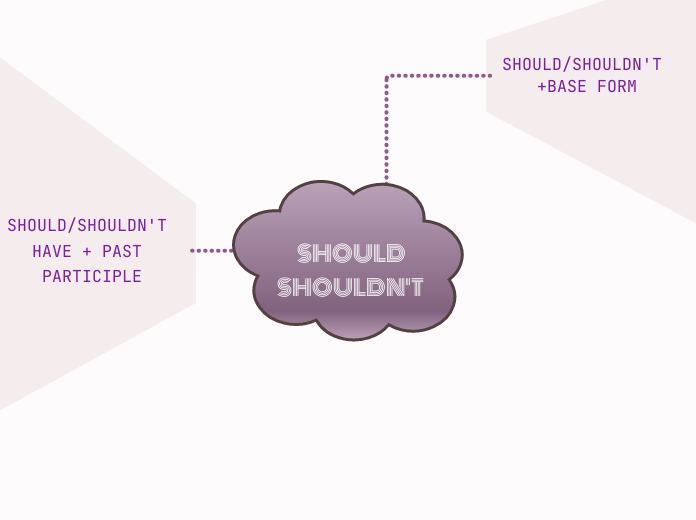SHOULD
SHOULDN'T
Tenses demonstrate the time of actions centered around the subject of the sentence. These actions are called verbs and change according to tenses.
SHOULD/SHOULDN'T HAVE + PAST PARTICIPLE
There are four Future tenses:
- Future Simple ('with Will' and 'with Going to')
- Future Continuous
- Future Perfect Simple
- Future Perfect Continuous
Soggetto + shouldn't have + past participle
I/you/he/she/we/they shouldn't have used so much plastic in the past
We use shouldn’t have + past participle when
we think something (in the past) wasn’t
a good idea, but we did it anyway.
Future Perfect Simple is used for:
- an action that will continue up until a point in the future
- an action that finishes just before another time or action in the future
Some adverbs used with Past Perfect Continuous for future actions:
- for
- since
- next week
- next month
- next year
Soggetto + should have + past participle
Future Perfect Simple is used for:
- an action that will be finished by a particular time in the future
- an action that starts before and continues up to another action or time in the future
- an action that will finish before a certain time in the future, but it is not known exactly when
Adverb used with Future Continuous:
- tomorrow (e.g. tomorrow by 7)
I/you/he/she/we/they should have used less plastic in the past
Structure:
Will + Subject + Have + Past Participle?
e.g. Will you have met your colleague by this time tomorrow?
We use should have + past participle when
we think that something (in the past) was a
good idea, but we didn’t do it.
Future Continuous is used:
- for an action that is likely to happen in the future and continue for an expected length of time
- for an action that will be in progress at some point in the future
- for action verbs (e.g. running)
- for predictions about future events
Adverb used with Future Continuous:
- tomorrow (e.g. tomorrow at 5 o'clock)
SHOULD/SHOULDN'T +BASE FORM
There are four Present tenses:
- Present Simple
- Present Continuous
- Present Perfect
- Present Perfect Continuous
PRESENT
Present Perfect Continuous is used:
- to describe an action that started in the past and has continued up to the present
- to describe an action that has just finished
Some adverbs used with Present Perfect Continuous:
- always
- only
- never
- ever
- still
- just
Interrogative form
(Should + soggetto + base form)
Structure:
Have/ has + Subject + been Verb-ING?
e.g. How long has he been learning German?
Should I/you/he/she/it/we/you/they buy more local food?
Type in your own examples or you can also choose from the examples below.
Form of word "to be":
Have I been being?Have you been being?Has he/she/it been being?Have we been being?Have you been being?Have they been being?
Form of word "to have":
Have I been having?Have you been having?Has he/she/it been having?Have we been having?Have you been having?Have they been having?
Negative form
(soggetto + shouldn't + base form)
Structure:
Subject + haven’t/hasn’t been + Verb-ING
e.g. She hasn’t been playing tennis for a long time.
I/you/he/she/it/we/you/they shouldn't always buy pre-packaged products
Type in your own examples or you can also choose from the examples below.
Form of word "to be":
I have not been beingYou have not been beingHe/She/It has not been beingWe have not been beingYou have not been beingThey have not been being
Form of word "to have":
I have not been havingYou have not been havingHe/She/It has not been havingWe have not been havingYou have not been havingThey have not been having
Affirmative form
(soggetto + should + base form)
Structure:
Subject + have/ has been + Verb-ING
e.g. They have been learning French for two years.
I/you/he/she/it/we/you/they should buy more local food
Type in your own examples or you can also choose from the examples below.
Form of verb 'to be':
I have been beingYou have been beingHe/She/It has been beingWe have been beingYou have been beingThey have been being
Form of verb 'to have':
I have been havingYou have been havingHe/She/It has been havingWe have been havingYou have been havingThey have been having
We use should or shouldn’t to give advice and to say what is or isn’t the right thing to do.
Present Perfect is used for:
- an action that occurred at a time which is indefinite and has its effect on the subject
- an action that occurred many times and has the possibility to occur in the present/future
- an action that began in the past and is still going on in the present
Some adverbs used with Present Perfect:
- just
- already
- yet
- for
- never/ever
- up to now









